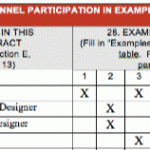
It seems like the perfect situation. You get an email from a firm asking you to be on their team for a proposal they are putting together. They will be the “prime” and you will be their “sub.”
Teaming arrangements can be great. There are plenty of firms out there that generate most of their revenue through teaming arrangements. Scraps from a large prime could easily be a feast for a small sub.
Not only that, but putting together proposal materials as a sub is almost always easier than putting together a prime submission.
Sounds great, right!?!? But before you say yes, there are a few things that you should consider.
Can You Perform The Scope Of Work?
This seem obvious. but it comes back to communication. What exactly is the scope of work this prime expects you to complete?
Will They Actually Use Us?
This might sound like a silly question, but it’s not. Primes want to win work. If they are smart and strategic, they will find the right teaming partners to meet all their participation goals/contractual requirements and give them a competitive advantage.
But they also want to generate revenue and profit. And primes usually have more resources than subs. If they can provide any specific service with their in-house resources, they may do that instead of using your firm. Yes, there may be long-term problems with that strategy. But few firms ever get criticized for their overabundance of long-term strategy.
This would leave you in a bad position, you helped them win the work and they stole back what you thought they had promised you. Not only that, they wasted your time and money.
Even though it often takes far less time and money to put together proposal materials as a sub, it would be foolish to discount both the hard and opportunity costs associated with this effort. They could be substantial.
How do you combat this? First, you could put together a teaming agreement, signed by both parties, that outlines either the scope of work or percentage you will get. Of course, if things go south you’ll have to sue the prime. In the end, that may cost you more than the revenue you would have generated.
You could also team only with firms you have a very high degree of trust with. These will often be primes that see the value of your contribution. A great relationship with a prime can be just as prosperous as one with an owner.
Do They Have A Reasonable Shot At Winning This?
It makes no sense to adhere to strict go/no go procedures when selecting opportunities to prime, but throwing them out the window when a teaming opportunity comes your way.
The problem is, you don’t know what you don’t know. They could have an “in” or advantage that you don’t know about. But on the other hand, they could be swinging wildly at any RFP they see. You have no idea.
They may also be reluctant to give you a great deal of information about their strategy and advantages if they believe you may team with another prime.
I would suggest you have a conversation to learn more about why they selected to go after this contract. It will be near impossible for you to perform a calculation to determine their chances. Ultimately, you will have to use your judgement based on what you hear and what they are willing to reveal.
Do We Have A Better Shot At Winning This As A Prime?
If you missed this RFP, that alone may indicate you aren’t well positioned for the contract. However, there are cases when a firm will share an RFP that you actually have a better chance of winning as a prime.
In this situation, you should have a conversation with them. I believe there is a bit of an ethical question here. If a firm sends you an RFP that you would not have seen, it would be pretty unethical to submit as a prime and not include that firm on your team. If someone gives you an RFP, I believe you have an unspoken obligation to them.
If it came out today, and you check that website in the afternoon…that’s a little bit of a different story. But for the most part, my rule of thumb stands.
Like I said, you’ll have to make the case that there are more reasons for them to be your sub than to prime. Depending on their ego, that may prove difficult in even the most obvious of situations. But again, if this is a trusted teaming partner, your two firms should be able to come to an agreement.
Does The Compensation Work For Us?
This is a complicated question. Sometimes, the prime will dictate the rates or cost. It’s important for you to know what those will be before you agree to team. You want to be careful about primes putting you in a money-losing situation.
Even If They Win, How Likely Is It That We’ll Be Needed?
I admit, this is a rare situation. But with large on-call contracts, clients may throw in every service they can think of when they will only likely need two or three.
This may not be a question of go/no go. Rather, it may be a question of level of effort. Unless you have some inside knowledge, it will be hard to determine the extent your services will be needed on “on-call” contracts. It will probably be a lot easier for lump sum contracts with a fixed scope.
Asking these questions will help you determine whether or this teaming opportunity is right for you or not.





Always a good call to go over these sort of opportunities as your company can be taken advantage of . Thanks for the heads up!
Subcontractors are often held to the prime contractor with the same requirements as the prime is held to the owner. This “pass-down”can include required meetings, site requirements, certified payroll reporting, time-consuming invoicing procedures, holdbacks, insurance, and many other things. Ask for a copy of the subcontract the prime will engage the sub in.